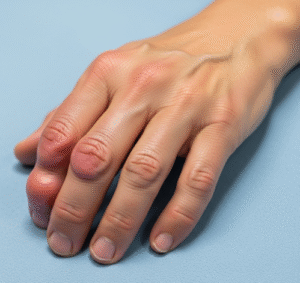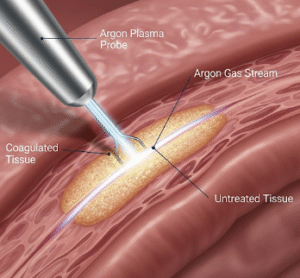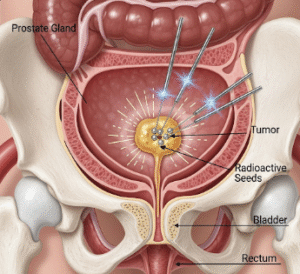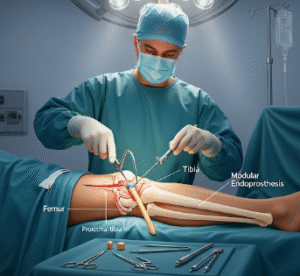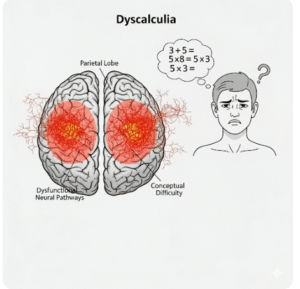Overview
Referred pain is a unique type of pain where discomfort is felt in a part of the body different from the actual source of the problem. For example, a person experiencing a heart attack may feel pain in the left arm, jaw, or back instead of directly in the chest.
This happens because the nerves that supply different parts of the body overlap in the spinal cord, making the brain interpret pain signals incorrectly.
In Korea, referred pain is carefully diagnosed using advanced imaging, nerve studies, and pain-mapping techniques, ensuring accurate identification of the underlying cause.
➤ Pain is perceived away from its origin
➤ Common in heart, gallbladder, kidney, and musculoskeletal conditions
➤ Can sometimes be the first warning sign of a serious disease
➤ Requires thorough medical evaluation to rule out life-threatening conditions
Key Facts
➤ Referred pain is not psychological – it has a clear neurological basis.
➤ Can appear in areas far from the actual organ involved.
➤ Examples include shoulder pain from gallbladder disease or jaw pain from heart problems.
➤ In Korea, early detection through advanced diagnostics helps prevent misdiagnosis.
What is Referred Pain?
Referred pain occurs when pain signals from one part of the body are misinterpreted by the brain as coming from another location. This is due to the way sensory nerves share pathways in the spinal cord.
For instance, when the heart is in distress, the brain may register pain in the left arm or neck because those areas share nerve pathways with the heart.
What Symptoms Are Related To
Referred pain may present as:
➤ Dull aching or pressure-like pain in a body part not directly injured
➤ Pain radiating to unrelated areas (e.g., back pain during kidney stones)
➤ Intermittent or persistent discomfort depending on the underlying cause
➤ Associated symptoms like nausea, sweating, shortness of breath, or digestive issues
What Causes / Possible Causes
Common causes of referred pain include:
➤ Cardiac Conditions
➤ Heart attack (chest pain radiating to arm, jaw, or back)
➤ Angina (exertional pain spreading to neck or shoulders)
➤ Abdominal & Digestive Conditions
➤ Gallbladder disease → pain in the right shoulder or back
➤ Pancreatitis → pain in the upper abdomen radiating to the back
➤ Kidney stones → pain in the groin or lower abdomen
➤ Musculoskeletal & Nerve Disorders
➤ Sciatica (low back pain radiating down the leg)
➤ Cervical spine problems (neck pain radiating into arms)
➤ Other Causes
➤ Lung infections or pleurisy → pain referred to the shoulder
➤ Gynecological conditions → pelvic pain radiating to the thighs or lower back
When Should I See My Doctor
Seek medical attention immediately if referred pain is associated with:
➤ Sudden chest pain with arm, neck, or jaw pain
➤ Shortness of breath, sweating, or nausea (possible heart attack)
➤ Severe abdominal pain spreading to the back or shoulders
➤ Unexplained groin pain with urinary issues (possible kidney stone)
➤ Persistent or worsening radiating pain despite rest
Care and Treatment
Treatment depends on identifying and addressing the root cause:
➤ Lifestyle & Home Care
➤ Rest, posture correction, and stress management
➤ Gentle stretching for musculoskeletal-related referred pain
➤ Medical Treatment
➤ Heart-related pain – medications, stents, or surgery
➤ Gallbladder disease – dietary modifications or surgery
➤ Kidney stones – hydration, pain management, or lithotripsy
➤ Spinal conditions – physiotherapy, medications, or minimally invasive surgery
➤ Pain Management Therapies
➤ Analgesics and anti-inflammatory drugs
➤ Nerve blocks or epidural injections in selected cases
➤ Physical therapy and rehabilitation exercises
Treatment Options in Korea
Korea provides state-of-the-art care for referred pain through specialized pain clinics, cardiology centers, and advanced imaging facilities.
➤ Advanced Diagnostics
➤ MRI & CT scans for spine and joint evaluation
➤ ECG, echocardiography, and cardiac enzymes for heart conditions
➤ Ultrasound & ERCP for gallbladder and pancreas evaluation
➤ Specialized Medical Care
➤ Cardiology centers for chest-related referred pain (e.g., Seoul National University Hospital)
➤ Gastroenterology departments for abdominal causes (e.g., Asan Medical Center)
➤ Pain clinics & rehabilitation hospitals for spine and nerve-related pain (e.g., Wooridul Spine Hospital)
➤ Innovative Therapies
➤ Minimally invasive spinal procedures
➤ Advanced cardiac interventions
➤ Laparoscopic gallbladder surgery for biliary-related pain
Final Thoughts
Referred pain is a warning signal, not just a discomfort. It often points to an underlying organ or nerve problem that needs timely attention.
In Korea, patients benefit from rapid, accurate diagnostics and specialized treatment centers, ensuring that life-threatening causes such as heart attacks, gallbladder disease, or kidney stones are not missed.
If you experience sudden, unexplained pain in an unusual location, seek immediate medical help to rule out serious conditions.


